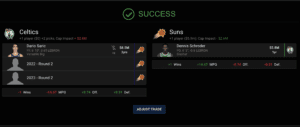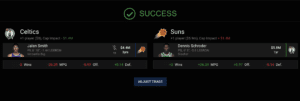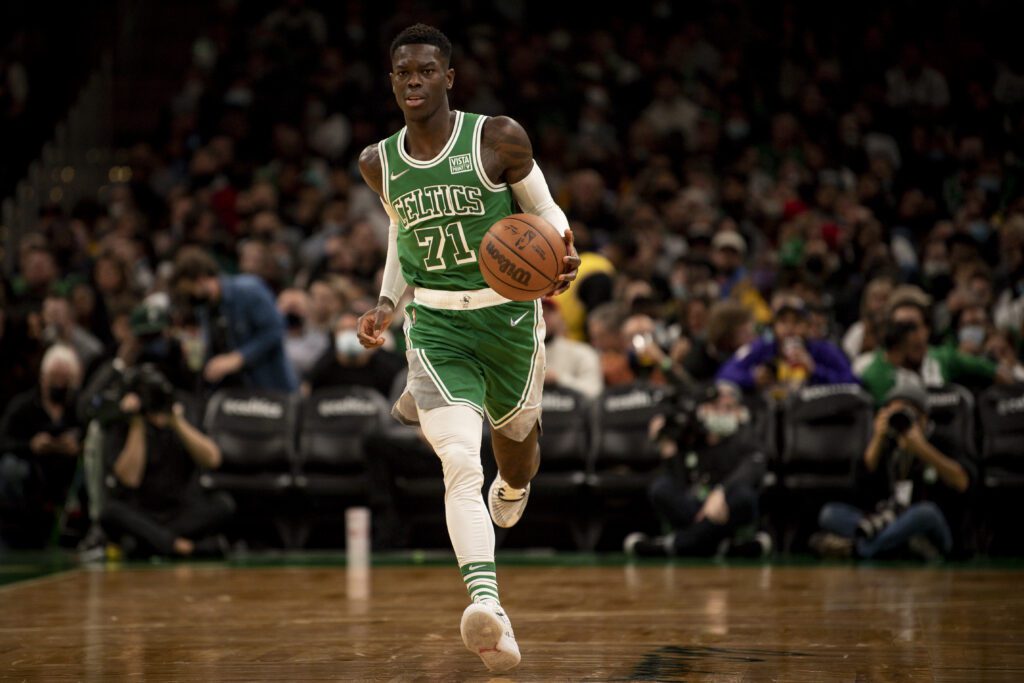NBA trade season officially opened Wednesday, with many free agents who signed in the offseason becoming trade-eligible. For the Celtics, that included Dennis Schröder and Enes Freedom, both having signed one-year deals in Boston. Shams Charania reported last week that rivals expect the Celtics to take calls on Schröder, given his solid production and the difficulty Boston will have re-signing him.
Marcus Smart remains ineligible due to his extension until Jan. 25, limiting the Celtics’ ability to make a major splash for now, but the rest of the roster, save for Jabari Parker (eligible Jan. 18), can be included in deals now, providing nearly full flexibility before the NBA trade deadline (Feb. 10).
“(Brad and I) are talking daily,” Ime Udoka told CLNS Media on Wednesday. “Obviously, we know dates are coming up and I’m sure people are starting to reach out and his phone is heating up a little bit, but we discuss that as well as the day-to-day stuff. So you always have an eye on the league and hear of the rumors of what’s popping up. Obviously a lot of times stuff doesn’t happen, but I’m sure there’ll be people reaching out. We have attractive players, as well as other people in the league, and we discuss it all. We haven’t sat down and gotten specific about it, but the dates are coming up and so you gotta be conscious of that for sure.”
The Celtics acquired Schröder, stunningly, on the taxpayer mid-level exception in August, short of $6-million for one season. The contract gave Boston no Bird Rights, meaning the team can’t use money above the cap to keep him this offseason. That leaves another mid-level exception ($6.1M per year) or a full mid-level exception ($10.1M, which would hard cap the team) as the only feasible ways to retain him. If Schröder finishes the season playing the way he has so far, he’ll probably depart the Celtics for at least the full MLE elsewhere.
Detroit, Oklahoma City, San Antonio, Memphis and New Orleans could potentially use cap space to swipe him from Boston. A team like New York could extend a full MLE to Schröder, which would require staying below the tax apron all of next season — which was $143-million this year, above the $136.6-million luxury tax. This season, 24 teams stayed below the hard cap line (10 actually hard-capping themselves, six did by adding a player via sign-and-trade, four by using the MLE), while only 10 could’ve potentially added a mid-level player and stayed below $143-million in salary. It’s worth noting the Celtics can’t send Schröder to another team via sign-and-trade without his Bird Rights. Of course, anyone could sign him to the same figure Boston did, even over multiple seasons.
That raises the prospect of selling high on the 28-year-old. He’s been a blessing for the Celtics’ offense as an elite finisher inside, primary ball-handler and secondary scorer and distributor. Schröder’s averaging 17.1 points, 3.6 rebounds, 4.8 assists and 0.9 steals per game, while shooting in line with his career marks. His activity on the defensive end allowed him to pair nicely with Smart in positive net rating rotations, while the duo’s lack of shooting limited the team’s spacing on offense. Schröder fit like a glove for a team that needed point guard and scoring depth.
There’s a chance Schröder could stay in Boston, but their cap situation already precludes them from using the full MLE until they offload Juancho Hernángomez’ $7.5-million non-guaranteed salary and the hard cap would limit their flexibility for a calendar year from there. It’d be nice to keep him in town for years to come (two or three years at ~10-million annually) and may be worth trying to if a search around the league yields unspectacular returns. Without using the MLE, Boston can offer a maximum of roughly $7-million annually through a 125% raise.
The Celtics should try to find a deal first. They’ve seen too many players in recent years depart the team for no return, and the sign-and-trades and trade exceptions they’ve executed and acquired won’t be a solution if Schröder finds a larger deal. This Boston team, intent on making a trade down the line, let Evan Fournier go, and didn’t extend a full MLE to Schröder in the first place, making it unlikely they would now. Flexibility.
That’s a concern for Schröder’s trade market too. If no teams exceeded the Celtics’ offer last offseason, an average year from the guard likely didn’t change anyone’s minds, barring shifting circumstances or needs for other clubs. Any team that would receive Schröder in a deal faces the same restrictions in keeping him that Boston does, so instead of giving away picks and players now for the guard, they could pursue him using cap space or the MLE in the summer.
That doesn’t completely stop a team from executing a deal now, but it probably narrows the number interested immensely. The middle of the NBA standings is packed, and guard depth could be a separator for a team like the Knicks trying to make the playoffs. Perhaps the Celtics could acquire a protected first-round pick from one of those teams.
The concern for Boston would be losing one of its cogs in its thin guard rotation, so receiving at least a stop-gap rotation player, or a young talent that hasn’t flourished elsewhere would be necessary unless the team sputters closer to the deadline. Then it’d be on to Payton Pritchard.
The Celtics should continue to wait through January and see where their record falls after a difficult stretch ahead, having recently reintegrated Jaylen Brown to the lineup. Then, they could also potentially use Schröder’s expiring salary as part of contract matching toward a larger deal if one emerges over that span.
Let’s assess some possible suitors in the meantime.
Hawks: They’re 14-14 on the edge of the eastern conference playoffs and struggling immensely on defense. Aging Lou Williams, struggling Delon Wright and young prospects Skylar Mayes and Sharife Cooper constitute the guard depth behind Trae Young. There’s some been-there, done-that with the prospect of acquiring Schröder, who played in Atlanta from 2013-2018 before getting dealt to open the door for the rookie Young to take over the team.
Now, he would fit into a smaller role, though one that could still help the team, leading the second unit and finishing passing sequences as a solid open shooter alongside Young. Atlanta may have bigger trade and consolidation aspirations, but Cam Reddish hasn’t worked and would provide an even salary swap, and become a player under cost and team control for Boston, with shooting and defensive pedigree at the wing. The Celtics would possibly need to throw in a pick to compensate Atlanta for being unable to retain Schröder long-term beyond this season.
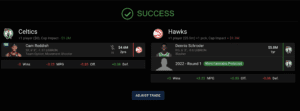
Knicks: New York might regret acquiring Kemba Walker and not Schröder. Still, the Celtics and Knicks now look like the two teams hungriest for long-term point guard options in the league. It’s not certain Boston will be able to acquire an unprotected first-round pick for Schröder due to his contract status, but if the Celtics decided to take Walker back with the one year remaining on his contract they could potentially pick up the Knicks’ pick that would be No. 10 overall in the lottery if the season ended today.
That’s an instant asset come-up for the Celtics, an opportunity for the Knicks to insert a scoring punch in their starting lineup who can also defend, while offloading Walker, who’s currently benched. Walker may not help the Celtics, but his familiarity with teammates in Boston and new reality as a bench player could allow him to score on second units and run the pick-and-roll in limited minutes toward a continued playoff push.
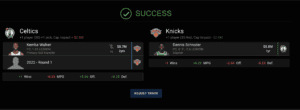
Bucks: A win-now team in search of depth and scoring. The Bucks loves to space the floor around Giannis Antetokounmpo, so Schröder may not be an ideal fit. Would they cash in one of their wing shooters, Grayson Allen, Donte DiVencenzo, or Pat Connaughton for a depth guard in Schröder? It’s a stretch, especially since Milwaukee’s bigger need is at the big man position, but they could be swayed into upgrading the George Hill-led point guard depth.
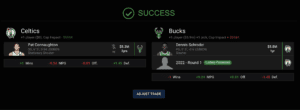
Nuggets: Starving for scoring and depth after injuries to Jamal Murray, Michael Porter Jr. and P.J. Dozier. They could be in the market for a rental guard, with Nikola Jokic playing at an MVP level that would make wasting this season precarious. What can they provide Boston? The Nuggets do own their first-round pick (No. 16), but maybe aren’t that desperate for a guard with Bones Hyland and Facundo Campazzo on the roster.
Austin Rivers is on a $1.7-million deal with a no-trade clause that doesn’t match Schröder’s money anyway. Jeff Green could potentially help the Celtics in a return, even as a streaky shooter, by giving them a third wing, or four-five hybrid signed for multiple seasons. JaMychal Green could also help Boston’s interior four depth alongside the Jays if they send Bruno Fernando with Schröder to match the money. There isn’t a perfect deal here, but there is a need for Schröder from Denver’s perspective. Could the Nuggets hedge with a protected pick?
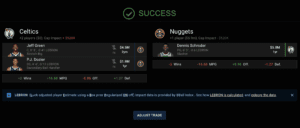
Suns: Phoenix has reportedly shopped 2020 lottery selection Jalen Smith, whose value is diminished by the Suns declining his third-year team option. That would limit Boston to essentially the same restrictions they face in re-signing Schröder, making the deal something closer to a fair value swap.
Schröder can help a championship contender and the Celtics by getting a 21-year-old big with shooting pedigree to Boston. If they pursue Dario Šarić instead, returning from ACL surgery in July, he would likely miss the rest of this season, but return on a $9.2-million deal next year as a medium salary and versatile big man. The Suns have no first-round pick to provide, owing it to Oklahoma City in the Chris Paul trade, but could send a future one or second-rounders in the near term.
